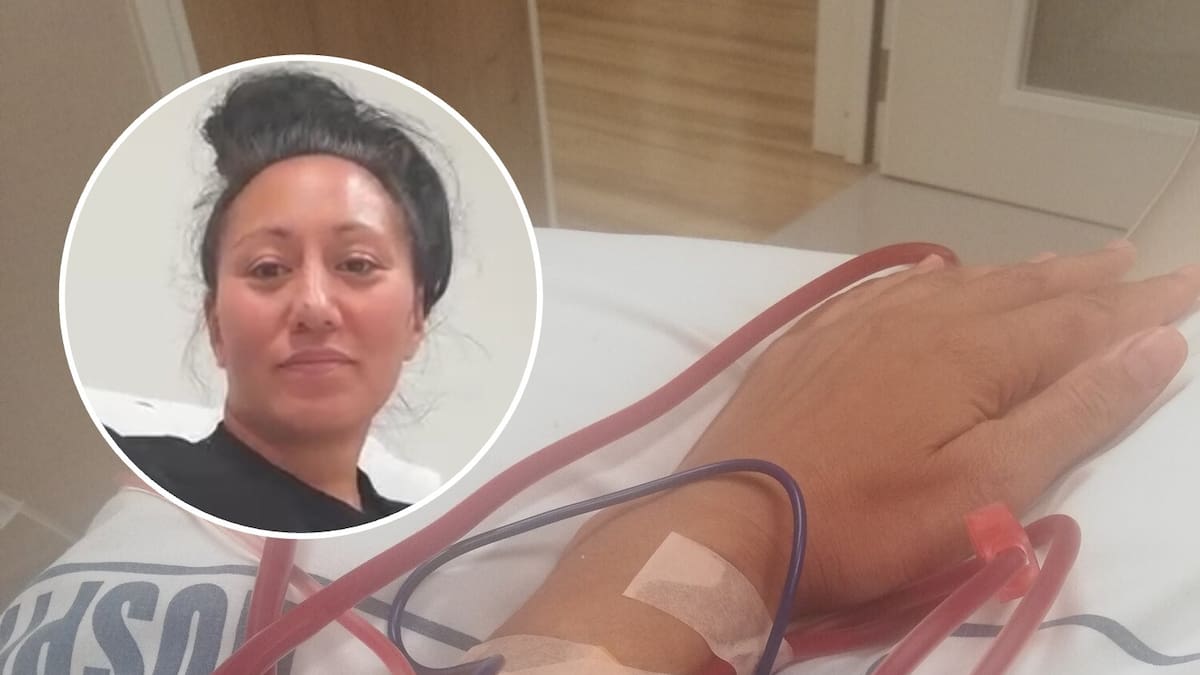“It feels like it’s never going to come, but you have to carry on because it’s out of your control,” Paul told the Herald.
“You have to do what you can to keep yourself healthy and get your monthly checks. That’s all I can focus on.
“When they find someone, when you are the best match, that’s when you will get the phone call – which could come at any time.”
Paul has Polycystic Kidney Disease (PKD), a hereditary kidney ailment from her mother’s side of the whānau. It affected her nan, aunty and uncle.
“An aunty received a kidney transplant but my mum died waiting,” Paul, 40, told the Herald.
Whānau and friends have offered to donate a kidney to Paul. Her partner of 23 years, Jared, had the most compatible kidney – but was ruled out after follow up tests.
Paul remains hopeful a compatible donor will be found.
“I try to be thankful for the things I do have like great kids and whānau support and even that I can do my dialysis at home,” she said.
“Apart from the kidney disease, I’m in good health.”
Paul knew she would develop PKD and ultimately need a kidney transplant.
“My mum had me tested when I was 20 and was told I was likely to develop it but was told to carry on and live my life,” Ramiri said.
In 2018, blood tests confirmed her kidneys were enlarged and had cysts, and she started dialysis in 2023.
“It has been rocky, and I’m not sure if it has made it any easier knowing I would develop PKD,” Paul said through tears.
Paul said when she first started dialysis it freaked out her two children Tame (12) and daughter Beau (10).
“Seeing my blood in the tube was tough on them but me starting dialysis at home has helped me normalise my condition.
“It’s more flexible [and] we can try to have as normal a family life as possible. I can do it at home for 8 hours a night, while I’m sleeping, 3 times a week.”
I want to live a full life where kidney disease is part of my story but doesn’t define it
Ramiri Paul
Paul said she is grateful for her whānau and partner Jared.
“When you asked what keeps me positive I said gratitude, but honestly it’s my kids, and partner who has been absolutely amazing,” Paul said.
“We were living in Invercargill when all this went down and moved back to Kawerau because we knew we would need that whānau support.
“Our whare is filled with love and laughter and that sustains me through the tough times. I want to live a full life where kidney disease is part of my story but doesn’t define it. My deepest wish is to live to meet my future moko. My mum passed away before Tame and Beau were born.”
Most New Zealanders affected by Chronic Kidney Disease (CKD) are unaware of it until it’s too late – and discover they have 10% kidney function.
Former Prime Minister Jim Bolger undergoes dialysis four times daily after his kidneys failed a year ago.
In 2024, 70 people donated organs following their deaths in Aotearoa, leading to 213 people receiving lifesaving kidney, liver, lung, heart, and pancreas transplants.
Dialysis costs about $70,000 a year and a kidney transplant also costs around $70,000 – the cost covered by Health NZ.
Sophie Hutana received a kidney from her partner Tom Hutana – now her husband, nine years ago. Donating body parts runs in her whānau.
She’s related to Grant Kereama – the man playing the trumpet in the Lotto adverts – who famously gave All Black rugby legend Jonah Lomu one of his kidneys.
Kereama’s sister Justine donated a kidney to a Whanganui nine-year-old, the daughter of a childhood friend.
Sophie and Tama had only been together two years when he donated to her, saving her from a lifetime of dialysis – and they now have two children together Ahi, 6 and Koa, 4.
“I live a very normal life now,” Sophie told the Herald.
Donating his kidney meant Tama gave up rugby for a season, and took sick and annual leave for his weeks of recovery.
The couple were given three weeks’ notice of a transplant date. Sophie was by Tama’s side as he was wheeled into the operating theatre at Wellington Hospital on October 5, and he was waiting in her room after her operation.
Sophie’s message to anyone considering becoming a donor is: “Giving an organ is daunting but you can change someone’s life.”
Joseph Los’e is an award winning journalist and joined NZME in 2022 as Kaupapa Māori Editor. Los’e was a chief reporter, news director at the Sunday News newspaper covering crime, justice and sport. He was also editor of the NZ Truth and prior to joining NZME worked for urban Māori organisation Whānau Waipareira.
